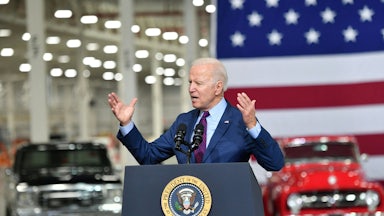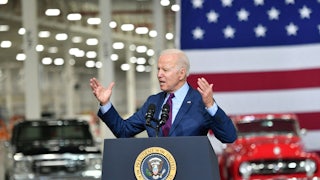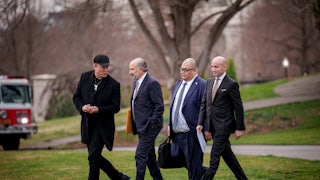The American West is 22 years into its worst megadrought since the year 800.* That’s being fueled by the climate crisis, which is, in turn, being fueled largely by the burning of coal, oil, and gas. A study published last week in Nature Climate Change found that 42 percent of this extended drought can be attributed to climate change, as can 19 percent of last year’s extraordinary heat and dry spell. GOP lawmakers in many Western states, meanwhile, are going out of their way to protect the fossil fuel executives doing everything in their power to make droughts worse.
At a meeting of its the Energy, Environment and Agricultural Task Force in San Diego last December, members of the fossil fuel industry–backed American Legislative Exchange Council, or ALEC, voted in support of draft model legislation that punishes financial institutions for divesting from or choosing not to invest in fossil fuels. Specifically, the legislation would require state fiduciaries to pull investments or contracts from financial institutions that, according to the charged language of the ALEC draft, “boycott energy companies.” ALEC has not responded to multiple requests for comment as to the nature of the vote in San Diego or on whether it’s supporting state-level efforts to pass similar bills, though in a recent blog post, it stated that the policy—the Energy Discrimination Elimination Act—“failed to become an official ALEC model policy” and that “discussion may continue” on it in the future.
Since the conference, though, like-minded bills featuring shared language have been introduced by Republican state legislators around the country. According to a registration list obtained by the Center for Media and Democracy (CMD is also the institution that first reported on the December ALEC meeting), several state lawmakers from drought-affected areas attended the meeting. Some have now gone on to sponsor legislation back home.
The Energy Discrimination Elimination bills, per the ALEC draft model legislation title, originated in Texas as the brainchild of the Texas Public Policy Foundation. Jason Isaac, director of the foundation’s “Life:Powered” initiative, helped lead the push to pass the only such legislation currently on the books, Texas Senate Bill 13, and to bring ALEC fully on board. In an email to ALEC task force members during the San Diego meeting, obtained by CMD’s Alex Kotch, Isaac framed the draft model legislation as an “opportunity to push back against woke financial institutions that are colluding against American energy producers.” As Politico reported, the Heartland Institute—long a bastion of so-called climate “skepticism”—has been involved in state-level pushes for separate, but similar, anti–sustainable investment bills.
Though Governor Greg Abbott signed S.B. 13 into law last summer, no state divestments appear to have been made as of yet. S.B. 13 and the copycat measures being proposed in other states were modeled on “anti-BDS” legislation that requires states to divest from companies critical of the Israeli government’s apartheid policies; last March, Arkansas’s anti-BDS bill was struck down by the U.S. Court of Appeals for the Eighth Circuit as being unconstitutional.
Typically, these new bills attempting to pressure banks to keep investing in fossil fuels require state treasurers or comptrollers to create and maintain a list of banks and asset managers that are suspected of “boycotting energy companies”—i.e., that are shifting their portfolios away from fossil fuels “without an ordinary business purpose.” State officials are supposed to seek clarification from financial institutions about their policies and then pull state money from those deemed guilty of boycotting.
Nearly 84 percent of Texas is currently affected by an expanding drought, made worse by a very dry January. Thirty-two percent of the state is suffering “extreme” drought (as opposed to “severe” or “exceptional,” on the lower and higher ends, respectively), leaving big stretches of the Lone Star State vulnerable to fires. Of the state’s 245 counties, 105 have implemented burn bans. Eighty-eight percent of registered voters in Texas worry about water access amid worsening heat, drought, and violent storms.
According to a poll of 815 people conducted by the Deseret News and Hinckley Institute of Politics, 82 percent of registered voters in Utah are concerned about the persistent drought there. Amid record dryness in 2020, the Great Salt Lake dropped below its 1963 historic low, leading to water restrictions for farmers, homeowners, and cities, the Deseret News reported.
Yet Utah, too, is considering legislation to force banks to keep investing in fossil fuels. Introduced earlier this month, Utah’s H.B. 312 would prevent public entities from entering into contracts of over $100,000 for financial services with a financial company that has a policy of refusing to finance fossil fuel companies. Companies would need either to provide “written certification” they they don’t have a policy to refuse to finance fossil fuel companies or to agree “not to adopt a policy of refusing to finance fossil fuel companies for the duration of the contract.”
Much of Oklahoma is engulfed by drought. It’s particularly severe in the western Panhandle, and has raised concerns among the state’s wheat and cattle producers. The Enid area, in the northern part of the state, has received less than an inch of rain in the last three months. “Recent conditions stand in stark contrast to drought conditions for the same time frame last year, when most of the state was drought free,” The Enid News & Eagle reports. State Senator Michael Bergstrom—who attended the December task force meeting in San Diego—introduced S.B. 1572 (the Energy Discrimination Elimination Act of 2022) earlier this month. It has yet to come up for a vote.
Beyond the West, other states where legislators have introduced energy-discrimination elimination legislation face severe effects from climate change. Louisiana—racked by hurricanes over the last decade—is home to the country’s first climate refugees and is losing roughly 25 square miles of land per year. Notoriously hot and humid New Orleans has the greatest urban heat island effect in the country due to its abundance of dark, heat-retaining surfaces like asphalt and concrete—a problem that, nationwide, disproportionately impacts Black and brown communities. House Bill 25—a measure that prohibits “retirement systems from investing in companies that boycott energy companies”—was introduced in late January and has yet to have a hearing in Baton Rouge.
Mountainous West Virginia, where coal-backed legislators have reintroduced energy-discrimination elimination legislation for the second year in a row, is more vulnerable to flood damage over the coming decade than any state in the union, recent data shows. Indiana experienced intense floods over the last week; which will only grow more common as temperatures rise. House Bill 1224, prohibiting the state government from investing in or contracting with companies that “boycott” energy companies, was introduced late last month there, though it has since floundered.
The irony of these preemptive anti-divestment bills is that banks aren’t currently making any real move away from fossil fuel investments. In January, Texas Lieutenant Governor Dan Patrick requested that Blackrock be “at the top of the list” mandated by the bill, for allegedly “turning its back on our flourishing oil and gas industry and the millions of Texans who rely upon it.” BlackRock, meanwhile, has not shown any signs of abandoning fossil fuels. Research from the German watchdog group Urgeweld revealed that BlackRock has over $100 billion invested in companies that represent 90 percent of the world’s thermal coal production and coal-fired power-generation capacity. Vanguard—another “Big Three” asset manager—has a comparable amount invested in coal, Urgeweld found. The other, State Street, is investing $36 billion in coal. All three are members of the private sector–led, U.N.-convened Glasgow Financial Alliance for Net-Zero, or GFANZ, having pledged to reach net-zero emissions across their portfolios by 2050. But BlackRock has reaffirmed its commitment to investing in fossil fuels and had $259 billion in fossil fuel investments as of June. “We will continue to invest in and support fossil fuel companies, including Texas fossil fuel companies,” read a memo signed by BlackRock head of external affairs Dalia Blass and sent to state officials in January.
A recent report from the Center for American Progress and Sierra Club found that, if they were a single country, just 18 U.S.-based banks and asset managers—nearly all of which are GFANZ—would be the fifth-largest polluter on the planet. The American West may well fry before either banks or Republican lawmakers agree to reconsider their fossil fuel allegiance.
* This article originally misstated that the current drought was the second-worst since 800.










